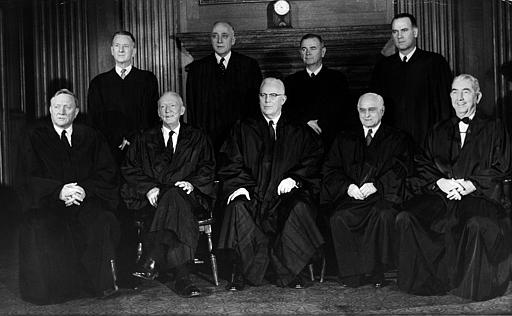Equal Representation, medical emergencies, and nervous breakdowns: the story of Baker v Carr, and how it shaped American history.
The Case
In April 1961 the Supreme Court accepted the case of Baker v Carr. In the case the appellant alleged that their constitutional right to vote was deprived by the Tennessee State Legislature’s refusal to reapportion districts from 1901 to 1961. They alleged that the state violated their 14th amendment right of equal protection by ignoring population growth in the state. The Court had two options: intervene and get in the middle of state redistricting, or stay out of the case completely and ignore everything.

The Justices
The man seated at the center of the picture is Chief Justice Earl Warren. During his time on the court he presided over many of the landmark Supreme Court cases we think of today: Miranda v Arizona, Brown v Board of Ed, etc. However when asked which he though was the most important case of his tenure he said Baker v Carr. But the focus should be places on two of his colleagues on the Court. Associate Justice Felix Frankfurter, was appointed by Franklin Roosevelt, one of the co-founders of the ACLU, and an advocate for judicial restraint. The other man is Justice Charles Whittaker, who only served on the court from 1957-1962, but he was a swing vote in nearly every case throughout his tenure and very unpredictable in his opinions.

A Court Divided
The Justices on the court were divided in their initial opinions of the case. Justice Frankfurter was fervent in his belief that the Court should stay out of what he called “the political thicket”. He believed that if the court waded into the middle of a state’s election process it would cause irreversible damage to the democracy as a whole. As the Court began hearing arguments from the lawyers on both sides, the justices themselves were split. With four Justices on either side and Justice Whittaker swing back and forth from one side to the other. As he had done in many cases before, Whittaker would sway in the wind of whatever opinions were being given by his colleagues. Justice Frankfurter was vehement is his convictions, and Justice Whittaker was feeling the pressure from his colleagues to decide. Whittaker could not make up his mind, so the case was brought back and re-argued for the next term in the fall of 1961.
Personal Struggles
After the re-argument in October 1961, the case was set to be decided again in the spring of 1962. Even though nearly a year had passed the Court was still at an impasse Whittaker could not decide. The stress was finally too much for Justice Whittaker, he had a nervous breakdown in March 1962. Under the advisement of Earl Warren, he recused himself from the case and retired from the Court on March 31, 1962. When the case was finally decided in late March, the court ruled that the appellant’s 14th amendment right has been violated. Justice Frankfurter was angered by this decision, and could not understand why his colleagues would do such a thing. On April 6th, 1962 he had a stroke while in his office. Justice Frankfurter retired from the Court in August 1962.
Why does this matter?

The aftermath of this case may seem insignificant, but they are anything but. The number of election law cases the Court has seen since 1962 have rose exponentially since the decision. The standard of “one person, one vote” given by the decision in Baker v Carr has led the court down a very difficult road. This case was a forerunner to the decisions in Citizens United, that twist such precedent in ways unimaginable. The other reason this case matters, is because it changed the court for the next decade. The landmark Supreme Court cases of the sixties and seventies would not have been possible if not for the retirement of Frankfurter and Whittaker. Their retirement led Presidents Kennedy and Johnson to fill those seats with very liberal justices. The Warren Court that is known of today would be quite different is not what happened in this case.
Why does it matter to me?
Every decision the court makes affects all Americans. If we today want to understand why our current government works the way it does, we have to look to the past. The study of this case shows that decisions made in the 1960s have long and far-reaching impacts our minds cannot comprehend. As Thomas Jefferson once said “A well informed citizenry is the best defense against tyranny” and “An educated citizenry is a vital requisite for our survival as a free people.”
